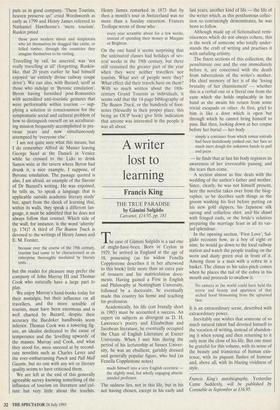A writer lost to learning
Francis King
THE TRUE PARADISE by Gamini Salgado Carcanet, £14.95, pp. 181 The case of Gamini Salgado is a sad one of might-have-been. Born in Ceylon in 1929, he arrived in England at the age of 18, possessing (as his widow Fenella Copplestone describes it in her afterword to this book) little more than an extra pair of trousers and his matriculation docu- ments. Having gained a First in English and Philosophy at Nottingham University, followed by a doctorate, he eventually made this country his home and teaching his profession.
Academically, his life (cut brutally short in 1985) must be accounted a success. An expert on subjects as divergent as D. H. Lawrence's poetry and Elizabethan and Jacobean literature, he eventually occupied the Chair of English Literature at Exeter University. When I met him during the period of his lectureship at Sussex Univer- sity, he was an ebullient, garishly dressed and generally popular figure, who had (as Fenella Copplestone notes)
made himself into a very English eccentric the slightly mad, but wholly engaging absent- minded professor.
The sadness lies, not in this life, but in his not having chosen, except in his early and last years, another kind of life — the life of the writer which, as this posthumous collec- tion so convincingly demonstrates, he was born to follow.
Although made up of fictionalised remi- niscences which do not always cohere, this is the work of someone who totally under- stands the craft of writing and practises it with unfailing artistry.
The finest sections of this collection, the penultimate one and the one immediately before it, are concerned with the death from tuberculosis of the writer's mother. His chief memory of her is of the 'loving brutality of her chastisement' — whether this is a verbal one or a literal one from the cane which she holds implacably in her hand as she awaits his return from some trivial escapade or other. At first, grief to him is like a door which is open but through which he cannot bring himself to pass. But then, looking down at her corpse before her burial — her body
simply a container from which rotten entrails had been fastidiously yanked out, her face so much inert dough for unknown hands to pull and press
— he finds that at last his body registers its awareness of her irrevocable passing, and the tears then come.
A section almost as fine deals with the wedding of the author's father and mother. Since, clearly, he was not himself present, here the novelist takes over from the biog- rapher, as he decribes such things as the groom washing his feet before putting on his new gold slippers, his Japanese silk sarong and collarless shirt, and- his shawl with fringed ends, or the bride's relatives preparing the marriage feast in all its var- ied splendour.
In the opening section, 'First Love', Sal- gado recounts how, as a boy of eight or nine, he would go down to the local railway station and watch the people trading on the worn and dusty green oval in front of it. Among them is a man with a cobra in a basket. The climax to his sales-pitch comes when he places the tail of the cobra in his mouth and proceeds to swallow it.
No camera in the world could have held the terror and beauty and apartness of that arched hood blossoming from the upturned face.
It is an extraordinary scene, described with extraordinary power.
Inevitably one wishes that someone of so much natural talent had devoted himself to the vocation of writing, instead of abandon- ing it when young and then returning to it only near the close of his life. But one must be grateful for this volume, with its sense of the beauty and transience of human exis- tence, with its piquant flashes of humour and, above all, with its blazing vividness of- style.
Francis King's autobiography, Yesterday Came Suddenly, will be published by Constable in September at £16.95.


















































 Previous page
Previous page